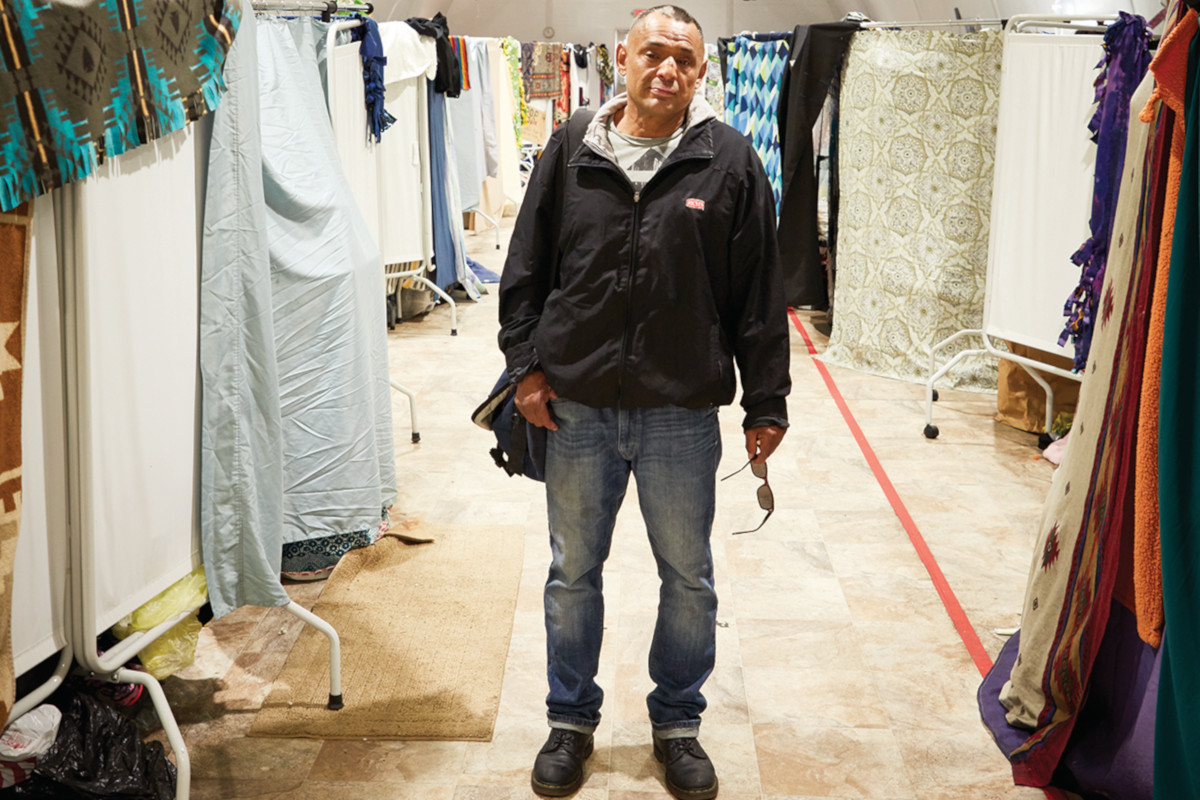
Photo credit: Michael Haug
In the fall of 2018, a Catholic Community Foundation of Minnesota (CCF) donor became increasingly concerned about an encampment of people experiencing homelessness that had developed on Hiawatha Avenue. As he passed it each day on his way to and from work, he wondered what would happen to those living in tents when temperatures would eventually plummet. Having grown up in Minneapolis, he felt this was his home and these were his neighbors.
From press reports, he knew that Native American organizations and other nonprofits serving the homeless were developing a plan to move residents from the encampment to a “Navigation Center” that would combine temporary shelter with wrap-around social services.
City officials were openly acknowledging they’d have difficulty raising the $1.5 million needed to build a temporary shelter — much less an additional $1.5 million to fund operations.
A Strong Calling to Serve
Knowing he had the funds to make a difference, the donor met with his family to discuss his desire to make a one-time donation to serve as a catalyst for community action in addressing the humanitarian crisis. With their full support, he took action.
“I knew we would need a partner to assist us with anonymously supporting the project,” says the donor. “Being Catholic and knowing about the great work done in our community by the Catholic Community Foundation, I phoned Anne Cullen Miller and told her about our family’s calling to support the Navigation Center.”
“I believe the timing of the call was providential,” says CCF President Anne Cullen Miller. She had driven by the encampment the day before and also worried what would happen when the weather changed. “It was an enormous challenge and not something CCF had ever done at that scale — but who could refuse to facilitate such generosity?”
A Coalition of the More-Than-Willing
While CCF didn’t have the internal resources to construct or manage a facility designed to house, feed, and provide services to nearly 200 people in dire need, Anne had a network of community partners who gladly agreed to help CCF maximize the impact of the donor’s generosity.
Her first call was Catholic Charities of St. Paul and Minneapolis. “At the time of the encampment, all of the shelters in the Twin Cities were already full,” says Tim Marx, president and chief executive officer of Catholic Charities. He was immediately on board to provide whatever assistance he could.
An Eight-Week Miracle
A team of government and nonprofit agencies moved heaven and earth to erect the temporary Navigation Center, where encampment residents could not only survive the winter but find paths to permanent housing and more stable lives.
While the City of Minneapolis bore the cost of building the center, the operational costs were funded almost entirely through the generosity of CCF’s anonymous donor.
“The Catholic Community Foundation was definitely at the table as we were figuring out logistics like how to pay for everything from snow removal and security to laundry and temporary toilet facilities,” says Steve Horsfield, executive director of Simpson Housing Services, the organization responsible for operating the Navigation Center.
“CCF gave us a great deal of flexibility which was important given the short time frame,” says Steve. “On the other hand, they expected us to be accountable for budgets and timelines.”
“In my 25 years in public service, I don’t think I’ve ever seen a project come together so quickly,” says Margaret King, who served as project coordinator for the Navigation Center and who had previously worked as director of housing programs at Seattle’s Downtown Emergency Service Center.
Spirituality in Action
Catholic teachings encourage sensitivity and respect for other cultures and their traditions. For this CCF donor, honoring Native American culture and spirituality was as essential as providing food and shelter. He was happy to provide financial support for the Native American “navigators” who connected residents with resources for stable housing, medical care, mental health, and chemical dependency services.
Mike Goze, president of the American Indian Community Development Corporation (AICDC) worked with the Minnesota Indian Women’s Resource Center (MIWRC) to recruit and manage the Native American navigators who helped ensure that traditional Native practices, prayers, and ceremonies were part of daily life.
“The funds provided by the Catholic Community Foundation paid for those services,” says Mike. “It really made a difference, particularly to individuals who were suffering from homelessness or substance abuse.”
Six Months Later
By the time the Navigation Center closed in June 2019, 49 percent of the encampment residents who moved there had been connected to housing, nursing homes, or treatment programs — many more than the typical 15 percent of adult shelter guests who move into permanent housing.
Margaret believes the leadership provided by the Metro Urban Indian Directors, a consortium of Native nonprofits, was key to the unprecedented success of the Navigation Center, “Going forward, this project will change the way public agencies interact with Native American nonprofits.”
The anonymous donor is grateful for having had the opportunity to serve, “Our family felt incredibly blessed to have been part of such a unique response to a crisis in our community. We feel a great debt of gratitude to CCF for providing such committed leadership throughout the journey.”
